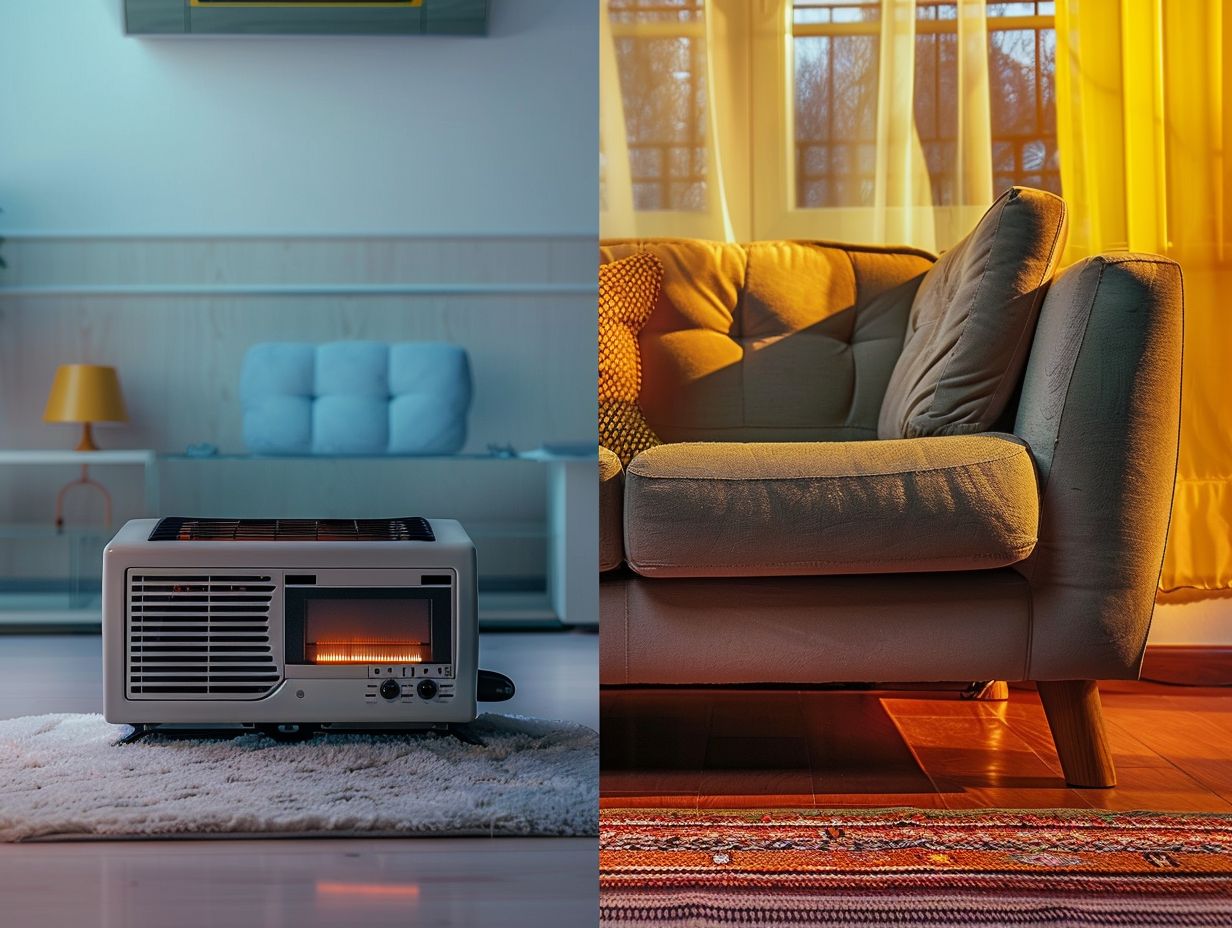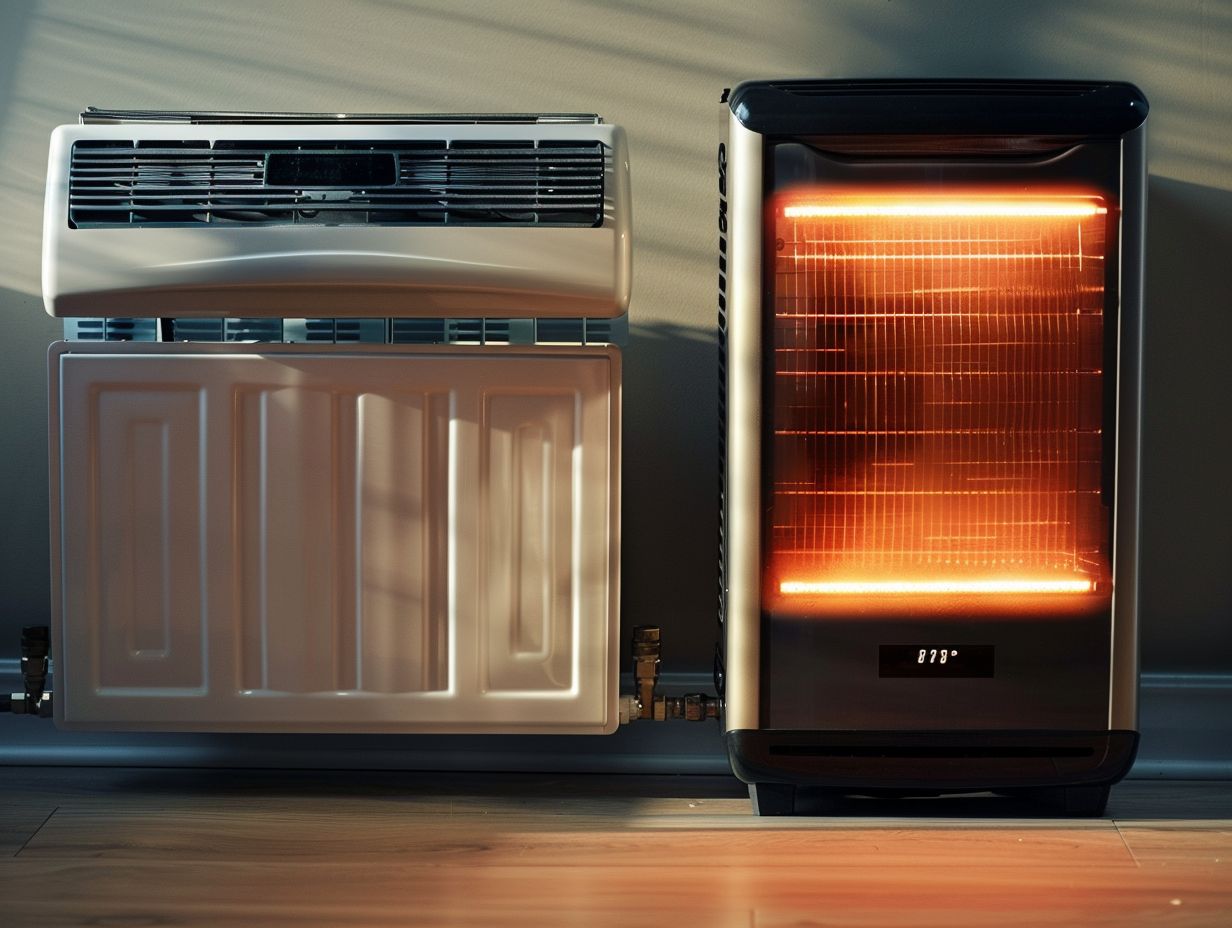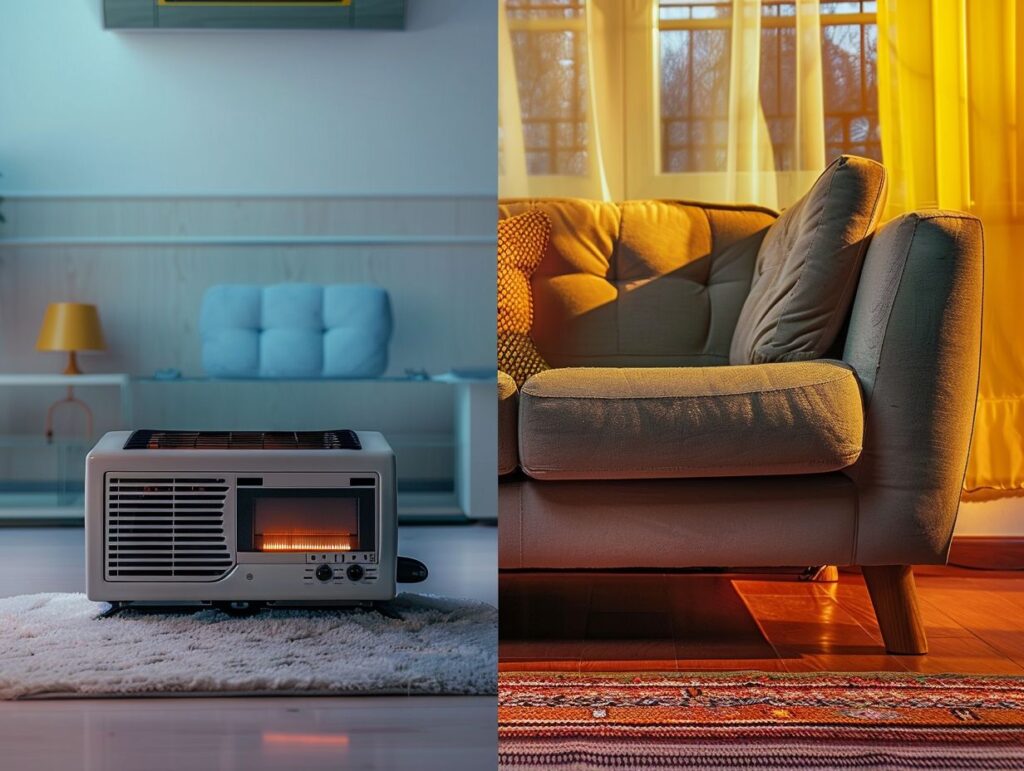If you are considering upgrading your home heating system and are unsure whether to choose electric or gas, this article will offer a detailed comparison of the two options. We will analyse factors such as efficiency, environmental impact, installation and maintenance costs, comfort, and convenience. By the conclusion of this article, you will have gained a better understanding of which option may be more suitable for your home heating requirements.
Key Takeaways:

- Electric heating is generally more energy-efficient and cost-effective than gas heating, with lower upfront and long-term expenses.
- However, gas heating may have a lower carbon footprint and emissions, making it a more environmentally-friendly option.
- When choosing between electric and gas heating, consider factors such as energy efficiency, cost, and environmental impact, as well as your personal comfort and convenience needs.
Overview of Electric and Gas Heating
When considering heating options for homes in the UK, two popular choices are electric and gas heating systems. Gas heating systems typically utilise a boiler to distribute central heating via radiators, while electric heating systems can consist of electric radiators or storage heaters.
Each system presents unique advantages and disadvantages, encompassing factors such as cost, maintenance requirements, efficiency levels, and environmental implications.
Gas heating systems are renowned for their efficiency and rapid heating capabilities when compared to electric counterparts. However, the fluctuation in gas prices can impact the overall running costs of these systems.
Conversely, electric systems are often perceived as more energy-efficient due to their ability to be easily managed on a room-by-room basis, thereby reducing energy wastage.
Another renewable energy option to consider is air-source heat pumps, which can deliver both heating and cooling functions by using electricity to transfer heat from the external air to the interior of a building.
These pumps are evaluated based on their CoP (Coefficient of Performance) rating, which reflects their efficiency in converting electricity into heat. Whereas gas heating predominantly relies on fossil fuels, electric heating systems can draw power from renewable sources, positioning them as a more environmentally-friendly choice that contributes to the fight against climate change.
Explanation of the Two Types of Heating Systems
Gas heating systems rely on a gas boiler to heat water which then circulates through radiators in your home. On the other hand, electric heating systems utilise electric radiators or storage heaters to provide warmth. Modern systems often incorporate smart thermostats for enhanced control and energy efficiency.
Boilers are essential to heating systems as they heat water that is then distributed throughout your house. Radiators function by emitting heat into rooms, thus increasing the overall temperature. Smart thermostats have gained popularity due to their ability to allow users to control heating settings remotely, leading to increased energy savings.
Energy tariffs can also affect heating expenses, with rates varying based on consumption levels. To address concerns about carbon emissions and global warming, heat pumps and hybrid systems are increasingly being used as sustainable heating alternatives. These systems leverage renewable energy sources to reduce environmental impact.
Efficiency of Electric and Gas Heating
When evaluating the efficiency of electric and gas heating systems, you need to take into account factors such as running costs, maintenance requirements, installation expenses, and overall energy efficiency. Each system presents its own advantages concerning heat output, water heating capabilities, and eco-friendliness.
Electric heating systems generally come with higher operational costs compared to gas systems, mainly due to the typically elevated cost of electricity. Despite this, electric systems are recognised for their lower maintenance requirements and simpler installation process, making them a convenient choice for many homeowners.
On the other hand, gas heating systems tend to be more cost-effective for heating larger spaces and can deliver a higher level of heat output. In terms of water heating, electric systems are considered more efficient and responsive, heating water quickly when needed.
When paired with renewable energy sources like solar panels, both electric and gas systems can significantly decrease carbon emissions, presenting a greener heating solution for environmentally-conscious users.
Comparison of Energy Efficiency and Cost
When comparing the energy efficiency and cost-effectiveness of gas and electric heating systems, you must consider factors such as the Boiler Upgrade Scheme, heat pump technologies, and the expertise of Gas-Safe heating engineers.
The decision between air-source heat pumps and traditional radiators can have a significant impact on the efficiency of heating in your home.
Upgrading boilers is crucial for improving overall heating efficiency in residences. For instance, modern combi boilers are well-known for their capability to supply both heating and hot water, thereby saving space and energy.
On the other hand, air-source heat pumps provide a more sustainable and environmentally friendly option by harnessing heat from the outside air to heat indoor spaces. Gas-Safe heating engineers are proficient professionals who ensure that heating systems are installed and maintained correctly, optimising performance and lowering operational costs in the long term.
Environmental Impact of Electric and Gas Heating

When assessing the environmental impact of electric and gas heating systems, you must consider their role in reducing carbon emissions and facilitating the transition to a Net Zero future.
Whilst gas heating systems rely on fossil fuels, electric systems have the potential to be powered by renewable energy sources, such as heat pumps and hybrid systems that utilise air-source and ground-source heat pump technology.
Heat pump technologies have emerged as sustainable heating alternatives, providing efficient methods to extract heat from the air or ground. Air-source heat pumps are particularly effective in moderate climates, whilst ground-source heat pumps offer consistent heating by using the earth’s stable temperature.
Ongoing advancements in these technologies have increased accessibility and cost-effectiveness, enabling households and businesses to adopt cleaner heating solutions for a more environmentally friendly future.
Assessing Carbon Footprint and Emissions
When calculating the carbon footprint and emissions associated with electric and gas heating systems, you need to consider various factors such as the Coefficient of Performance (CoP), fluctuating gas and electricity prices, overall system efficiency, running costs, maintenance needs, and installation expenses.
Opting for low-cost, high-efficiency solutions can play a crucial role in reducing the environmental impact of your home heating system. Understanding how the CoP measures the ratio of heat output to energy input is essential for homeowners to accurately assess the efficiency of their heating systems.
Analysing the cost implications of gas and electricity prices can offer valuable insights into the financial sustainability of different heating options. Investing in high-efficiency heating systems not only helps in reducing emissions but also results in lower running costs over the long term, making it a sound financial decision.
Highlighting the importance of regular maintenance in maintaining system efficiency, in addition to exploring sustainable heating solutions, can further contribute to minimising the overall carbon footprint of your home heating system.
Installation and Maintenance Costs
When considering heating systems, you should assess the upfront installation costs, ongoing operational expenses, maintenance needs, and overall effectiveness. Factors such as the type of heat pump (air or ground source) and the system’s energy efficiency are critical in determining its cost-effectiveness.
As you evaluate heating system options, remember to consider factors like property size, insulation quality, and local climate conditions that can impact efficiency and operational costs. Regular maintenance is essential to ensure optimal system performance, efficiency, and to minimise energy wastage and costly repairs.
Opting for energy-efficient solutions not only reduces monthly utility bills but also aids in lowering environmental impact by decreasing carbon emissions.
Upfront and Long-term Expenses
When evaluating the upfront and long-term expenses associated with heating systems, you need to consider factors such as the type of system, heat generation for water heating, renewable energy integration, and low-carbon solutions.
It is important to also take into account government initiatives and incentives that can help promote cost-effective and sustainable home heating options.
For homeowners like yourself, the initial investment in a heating system can vary significantly depending on the technology chosen, installation requirements, and energy efficiency ratings.
Whilst traditional systems may have lower upfront costs, the long-term operational expenses can be higher due to their reliance on fossil fuels.
On the other hand, choosing renewable energy sources such as solar panels, heat pumps, or biomass boilers can result in lower monthly utility bills and reduced carbon emissions.
Given the increasing emphasis on sustainability, government support for green energy initiatives can further reduce costs and make environmentally friendly heating solutions more accessible to a wider audience.
Comfort and Convenience
When selecting a heating system for your home, it is essential to prioritize comfort and convenience. Several factors, including the type of heating system, environmental impact, energy efficiency, and greenhouse gas emissions, can affect the overall comfort and convenience levels in your living space.
Choosing the right heating system is not just about staying warm in cold seasons; it also plays a crucial role in creating a comfortable and easily manageable living environment. By selecting a system that meets your household’s specific needs and preferences, you can enhance the comfort levels of your home.
Environmental considerations, such as opting for energy-efficient options and reducing greenhouse gas emissions, not only benefit the environment but also contribute to a healthier and more comfortable indoor atmosphere for you and your family.
Factors Affecting Comfort and Convenience

When considering the comfort and convenience levels of a heating system, several factors come into play. These include the type of system being used, the heat source (air or ground), integration of renewable energy, low-carbon solutions, adherence to government regulations, and the decision between radiators or underfloor heating.
Additionally, both installation and operational costs are key determinants of overall comfort. The heating source, whether it is a traditional gas furnace, a modern heat pump, or a geothermal system, directly impacts efficiency and operational expenses.
Integrating renewable energy sources, such as solar panels or biomass boilers, not only reduces carbon emissions but also leads to long-term cost savings.
Government policies that promote energy-efficient solutions can encourage homeowners to invest in sustainable heating technologies.
When comparing radiators and underfloor heating, radiators are typically more cost-effective in terms of initial installation costs. However, underfloor heating offers more uniform and consistent heat distribution, resulting in an enhanced level of comfort for the occupants.
Which is Better for Your Home?
When considering the best heating system for your home, it is important to take into account various factors.
These include the energy requirements of your household, the current infrastructure in place, operating expenses, maintenance needs, feasibility of installation, environmental impact with regards to climate change, and the availability of modern heating solutions such as air-source heat pumps.
Additionally, the choice of system – whether it be gas central heating or electric radiators – and the inclusion of additional features like towel rails can further improve the comfort levels within your living environment.
Gas heating systems are renowned for their efficiency and ability to quickly generate heat, making them a favoured option among homeowners. On the other hand, electric heating systems are gaining popularity due to their lower maintenance demands and reduced environmental footprint.
Regarding installation, gas systems may require more intricate setups, whereas electric systems offer simpler and more adaptable installation processes.
The introduction of air-source heat pumps has ushered in a new era of energy-efficient heating systems that not only provide warmth but also offer cooling functionalities.
Incorporating amenities like towel rails can not only supply warmth for towels but also introduce an element of luxury and comfort to your residence.
Considerations for Choosing the Right Heating System
When selecting the appropriate heating system for your property, you should carefully evaluate various factors.
These include the presence of a mains gas supply, accessibility to electricians for electric heating systems, labour costs, installation of electric elements, energy-efficient solutions, radiator options, maintenance requirements, repair considerations, and potential disruption during installation.
It’s crucial for you to also consider the specific requirements of the buy-to-let sector, where reliability and low maintenance are key selling points. For landlords, having the ability to easily control and monitor heating remotely, possibly through smart technology, can provide a significant advantage.
Electric heating elements are becoming increasingly popular due to their efficiency and ease of installation. When considering repair services, it is important to look for providers who offer quick response times and competitive pricing. This ensures that any heating system issues can be promptly addressed to minimise tenant discomfort and property damage.
Frequently Asked Questions
What is the main difference between electric heating and gas heating?
The main difference is the source of energy used to generate heat. Electric heating uses electricity to produce heat, while gas heating uses natural gas or propane.
Which type of heating is more cost-effective?

This largely depends on the cost of electricity and gas in your area. In general, electric heating tends to be more expensive because electricity is usually more expensive than gas. However, with the rise of renewable energy sources, electric heating can be a more cost-effective and environmentally-friendly option in some areas.
Are there any differences in terms of installation and maintenance?
Yes, there are some differences. Electric heating systems usually have a simpler installation process as they do not require any external fuel source or venting. However, they may have higher maintenance costs as they have more components that can malfunction. Gas heating systems, on the other hand, require proper venting and may require regular check-ups for safety reasons.
Which type of heating is more energy-efficient?
In general, electric heating is considered to be more energy-efficient. This is because almost all the energy used is converted into heat, whereas gas heating systems lose some heat through the venting process.
Do electric and gas heating provide the same level of comfort?
Yes, both types of heating systems can provide the same level of comfort. However, some people may prefer the warmth produced by gas heating over electric heating, as it is often described as a more “natural” heat.
Can I convert my gas heating system to electric or vice versa?
It is possible to convert a gas heating system to electric or vice versa, but it can be a costly and complex process. It is best to consult a professional to assess the feasibility and cost-effectiveness of such a conversion.

